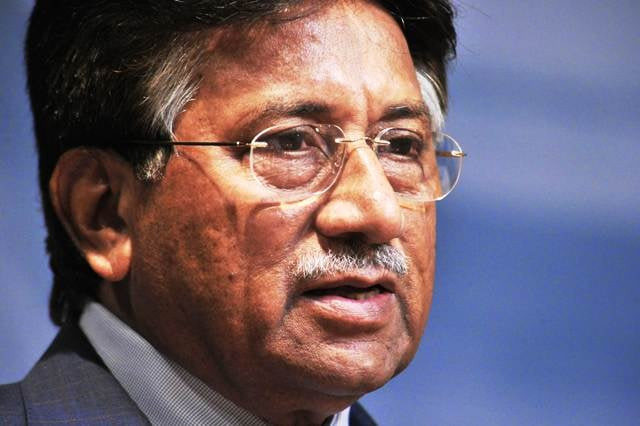US using Pakistan as a scapegoat for failure in Afghanistan: Musharraf
Musharraf says that US needs to realise Pakistan's interests in a peaceful and stable Afghanistan.

In an exclusive video link interview with Express 24/7, the former President said Pakistani forces should use whatever influence they have and tell the Haqqanis not to cross the border.
Terming the recent statements by former Joint Chiefs of Staff Committee chairman, Admiral Mike Mullens that Pakistan's ISI was supporting the Haqqani network as irresponsible, Musharraf said that the blame game needs to stop and that Pakistan and the US need to come onto the same page against a common enemy. He said that the world needs to understand the standpoint of Pakistan, and unless the US stops violating Pakistani interests, there would be no more alliance.
(Read: ‘Strategic assets’: ISI must disengage from proxies: Mullen)
Musharraf, while criticising the All Parties Conference for not inviting him, said that these terms, with no call to action, could all have been agreed within 30 minutes and did not need 10 hours. Musharraf insisted though that the future lay in talking to the peace seeking Taliban.
(Read: Full text of the APC resolution)
He said pointed out that while not all Pashtun were Taliban, all Taliban were Pashtun. Musharrraf said that we need to identify the peace seeking Taliban and hold reconciliatory talks with them. Unfortunately, Musharraf says, this selective process had been dubbed by the US as a sort of double game.
Musharraf also said that the US was responsible for controlling Haqqani activity on the Afghan side of the border. However, he pointed out that India was being accorded space in the Afghan peace process at the cost of Pakistan. “Any result of a peace process in favour of India would not be acceptable to Pakistan and the US must understand this.”
He said that Pakistan must use all media sources, internal and external to media to project Pakistan’s interests and reasoning in Afghanistan.
Musharraf also reminded the US that it was the Pakistan army which had conducted a successful operation in Swat against the Tehrik-e-Taliban Pakistan.
Drone strikes
The APML chief categorically rejected allegations that he, in a deal with the then Bush government had allowed drone strikes in Pakistan saying that only logistical support for unarmed drones had been extended. He went on to mock the current government saying “if there was an agreement between me and the US, ok if there was, but why has the new government gone ahead and broken this agreement?”
He went on to say that during his time in office there had been a total of nine drone strikes while these had exponentially increased during the term of the current government.
Hampered peace
Musharraf said that Pakistan’s greatest desire in a stable and peaceful Afghanistan. For this reason Pakistan was supporting Burhanuddin Rabbani led peace talks.
“Paksitan will be the loser if there is no peace and stability in Afghanistan,” he said.
However, with the US stated desire to leave Afghanistan, it was like history was repeating itself and this the US should not allow to happen.
Musharraf was of the opinion that Pakistan and Afghanistan needs to talk to all those factions of Taliban that seek peace.



1725254039-0/Untitled-design-(24)1725254039-0-208x130.webp)















COMMENTS
Comments are moderated and generally will be posted if they are on-topic and not abusive.
For more information, please see our Comments FAQ